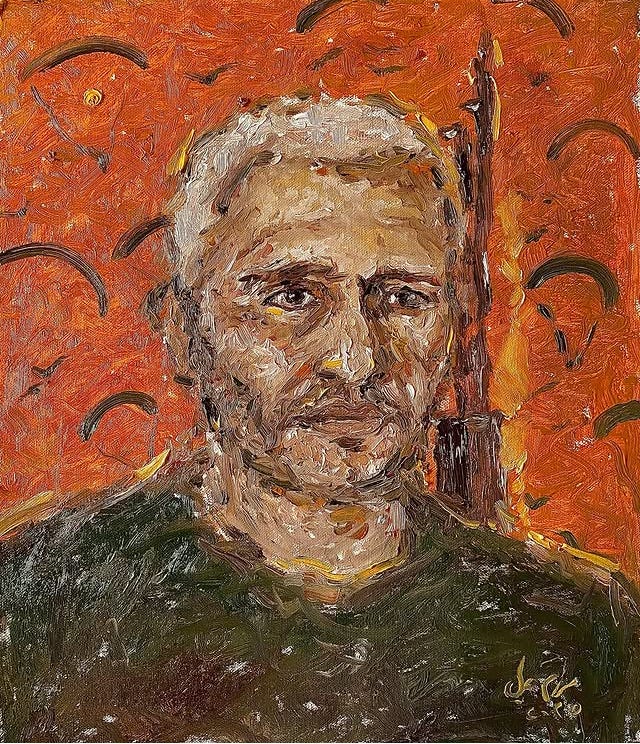
After surviving at least 7 assassination attempts by the Zionist occupation, July 13, 2025 marks the one-year anniversary of the martyrdom of esteemed Hamas Commander Mohammad Al-Deif.
“Never say that those martyred in the cause of Allāh are dead—in fact, they are alive! But you do not perceive it” (Chapter 2, Chapter of ‘The Cow,’ Verse: 154).
﷽
Bismi Allāh Al-Raḥmān Al-Raḥīm
(In the name of Allah the Most Gracious, the Most Merciful).
Rabī Ishraḥ Lī Ṣadry, Wayasir Lī Amry, Wa’ḥlul ʿUqdatan Min Lisānī, Yafqahu Qawlī
(Moses’ prayer in the Qurān: Allah! Expand for me my breast! Make my affairs easy for me, and untie a knot from my tongue, that they may understand my speech) (20: 25-28).
Requiem for a Dream: The 30th of Ramadan of the Hijra Year 1446
My beloved Prophet Muhammad (peace be upon him) taught that: “The worst of lies is that of a person who falsely claims to have a dream.”
I’m speaking of the gift of dreams that effervesce when we’re tired and drowsy, the dreams that Allah inspires and awakens as a bridge between spirit worlds when He states: “And we [mercifully] made sleep for you [all creation] to rest” (Chapter 78, Chapter of ‘The Great News,’ Verse: 9).
Islam holds that there are three types of dreams: Righteous dreams (Rahmani) that denote glad tidings from Allah, disturbing dreams (Shaiytani) that are a product of Shaiytan (the devil), and dreams concocted from the ramblings of the mind (Nafsani).
Towards the end times, dreams will become scarce.
Prophet Muhammad (peace be upon him) explains that this is because: “Prophethood and its effects will be so distant in time, that believers will be offered rare and even rarer compensations in the form of dreams which will bring them some good news or will help them to be patient and steadfast in their faith.”
Islam - that is dearer to me than those I love and my own life - commands that upon revelation of a blessed dream one ought to offer praise and thanks to Allah and narrate that dream to others.
Of course as with other traditions, Islam is dynamic and there are always exceptions to the rule. Good dreams aren’t always meant to be narrated or shared as per the example of Prophet Yusuf because of the jealousy of his half-brothers. In the Qurān, Prophet Yaqub (peace be upon him) told his son Prophet Yusuf (peace be upon) about his dream about eleven stars and the sun and the moon prostrating to Yusuf. Scholars noted that the eleven stars were his brothers, and the sun and the moon represented his mother and father.
The Qurān reveals why Prophet Yaqub extolled his son Prophet Yusuf not to reveal the contents of the dream: “He said, ‘O my son! Relate not your vision to your brothers lest they arrange a plot against you. Verily! Satan is to man an open enemy.” (Chapter 12: Chapter of ‘Yusuf,’ Verse: 5). In this instance, Allah forbade Prophet Yusuf from relating the dream to them lest it serve to feed his half-brothers’ envious ambitions and impulses.
But this dream is one to share. True dreams correlate with a believer’s sincerity, so I pray that Allah protects and guides me away from self-deception and the replication of taghūt (tyranny) as I relate this cosmic dream of mine to you. It’s a dream that revolves around the most honorable of men and his legacy. I’m speaking of my vivid dream featuring the great Hamas commander and martyr Mohammed Al-Deif.
His real name is Mohammed Diab Ibrahim al-Masri, but de jure he was known as ‘Al-Deif’ because he was always a nomadic guest that never slept in the same place for more than a fortnight.
In Islam, Al-Deif is always a guest sent by Allah. To invite and honor the guest is an incumbent act of hospitality in Islam.
The honorable commander Al-Deif came to visit me on the last day of Ramadan 2025. Since our meeting, I’ve been left holding pieces of this divine encounter that effervesced inside Gaza’s miracle tunnels that Al-Deif himself helped conjure and expand.
This is the dream story of how I became the guest of the guest.
With my head in the skies, Allah yanked me down to ground level like gravity pulling me into all that is below. I had no time to fall, I was transported.
In my dream - free of hallucinations and sober as I write these words now - I found myself waking up deep in the mujahideen’s webbed tunnels in Gaza, tunnels that the Commander helped envision and build.
Like so many heroes of the Ummah, Al-Deif was a futurist, who wielded an undying faith to dream and alchemize a seemingly impossible future for his people.
In my dream vision of the tunnels, I laid on a single mattress with a modest shelf to my left – stacked with a copy of the Qurān and 3-4 other texts. At the bottom of the book rack were a few small, already assembled figurine children’s toys.
As enthralled as I was being in the tunnels, something else captivated my attention above all else: The divine scent of musk. I was obsessed with its source. It consumed the room’s fresh air wholesale. I could smell it on the bed. On myself, on all I touched.
The insatiable oud (eaglewood) fragrance otherwise known as the ‘Wood of God’ drowned the atmospheric suffocating toxic fumes of the 6-ton bunker busting bombs. I could feel the explosive armaments tossed and landing from up above by Zionists at the behest of Crusading Euro-American flags.
That’s when the shaheed (martyr) commander Mohammad Al-Deif appeared to me. He was dressed in his wounds, as is decreed for martyrs when they pass. Through his long white shirt, I witnessed his coagulated dried red blood that had become dark brown (also decreed for martyrs in Islam). My beloved commander leaned over, bending towards me, and uttered with a gentle smile and soft but firm voice: “Assalam alikum from one mujahid to another.”
My face was frozen at his radiant sight. In my eyelid’s blink he disappeared, before I could reciprocate his hospitality back with: “wailkum assalam warahamatuh allah wabarakatuh (Allah’s peace and blessing be unto you) beloved commander. I hope to meet you soon when the day breaks through.” After all, Allah teaches, “And when you are greeted with a greeting, respond [in return] with a better greeting or [at least] return it [in a similar manner]. Indeed, Allah is ever, over all things, an accountant.”
In preponderance and hindsight, I realized then, as I do now, that all this time in the tunnels (that felt as an eternity) I had the honor of resting and sitting on the edge of the Commander’s modest mattress. He vanished before my watery eyes could dry or even my hunger could be quenched with his sight. I remained on his bed reading from his worn copy of the Qurān. I alternated between my recitation and playing with the miniature toy-gifts - that the Commander was long known to have shared and distributed to Gaza’s orphan children before his own.
About The Commander: My Host
Al-Deif was born in Khan Yunis on August 12th, 1965 where he spent his childhood. His family was poor and during the 1948 Nakba, they were forced by Zionists to flee Al-Qubeiba - a now erased town, near Ramleh - to Gaza. His father was a poultry farmer, a driver, and worked in spinning and upholstery, and he relied on Al-Deif to help him with work. From nascency, Al-Deif witnessed the brutality of the Zionist entity upon the Ummah, Palestine, and his family and without hesitation upon the opportunity’s availability accompanied the ranks of Gaza’s mujahideen.
Al-Deif helped found the Hamas movement in 1987 and rose to become Commander of Al-Qassam (the military wing) in 2002 after the Israeli assassination of martyr Salah Shehade. Al-Deif was key in masterminding Al-Qassam’s ingenious combination of subterranean tunnel warfare and air-bound rocket attacks against the occupation while under siege in Gaza.
He was a multifaceted visionary, a master of both earth and sky.
In 1989, soon after becoming a mujahid, Al-Deif was arrested by the Zionist entity and spent 16 months in prison without trial, under constantly renewed “administrative detention” on account of his involvement with Al-Qassam.
Upon his release from the entity’s prisons, Al-Deif returned to Gaza and began cultivating his multi-skills in the affairs of war and resistance. Al-Deif became an expert bomb maker, studying the craft as a disciple of the talented Yahyia Ayash, a man dubbed by the muqawama as “The Engineer (al-muhandis)” who was assassinated by the Zionist entity in 1996.
In the mid-1990s, Zionist Prime Minister Shimon Perez asked Palestinian President Yasser Arafat to re-arrest Al-Deif, who had planned several tactical bombings of settler buses in the 1990s and later the 2000s including the infamous 1996 Jaffa Road bus bombings. Al-Deif also notably organized the kidnapping and killing of 3 Zionist soldiers in the 1990s, his initial intent being to leverage the three prisoners as bargaining chips for the release of Palestinian hostages from Zionist jails. Al-Deif also helped found the resistance in the West Bank.
During the 1990s, the Palestinian Authority (PA) (Israel’s puppet governing force) tried to dismantle Al-Qassam. They seduced as well as terrorized some of Al-Qassam’s prominent mujahideen figures into joining the PA, a strategy which divided Al-Qassam. Most of the mujahideen who joined the PA were from Khan Yunis and were long time friends of Al-Deif. Despite the pain Al-Deif felt at their abandonment and his disagreements with them, he still loved them. The PA attempted to recruit Al-Deif but he kept steadfast in remaining part of the resistance in Gaza.

He rebuilt Al-Qassam from a state of weakness to even stronger than it was before, joined by new prominent figures who would infuse the movement with strength, including Adnan Al-Ghoul, Marwan Issa, Ahmed Jabari, and the legendary General Yahya Sinwar.
The Commander (also known as Abu Khaled) was selfless, and up till his martyrdom he remained largely unphotographed, unrecognized, unidentifiable. In fact, the only photo the Zionist entity had of the Commander before Al-Aqsa Flood, was a picture of him when he was in his 30s. All thanks to Allah and our mujahideen, we have more photos of him since his martyrdom.
In May 2000, at the behest of the Zionist entity, the collaborating PA arrested Al-Deif, but he managed to escape 7 months later.
Miraculously, Al-Deif was the organizer of Zionist soldier Gilad Shalit’s infamous June 2006 kidnapping whose release in 2011, orchestrated by General Sinwar himself, would allow for the General’s freeing of 1,026 Palestinian hostages.
Al-Deif was known by the Zionist entity as the “cat with nine lives” - he had up until his martyrdom survived, by Allah’s will, at least, seven assassination attempts.
A ghost in broad daylight, never coveting attention, clout or recognition, Al-Deif yearned solely for Allah’s pleasure. The people of Gaza knew of Al-Deif but would notoriously state: “If we saw him, we wouldn’t know him.” Even the mere public casual inquiry about the Commander or his whereabouts was enough to get someone arrested by the Zionist entity.
The phantom Commander never bore witness to the birth of any of his children into this world. He would celebrate all their birthdays on the same day when he had time to join them. The Commander’s dedication to the muqawama was unparalleled - he even missed his mother’s funeral in 2011 so as not to endanger several thousand of his family’s mourners, including leaders from Hamas.
The exceptionally intelligent and said to be quite funny Commander was married twice. He loved his family deeply and was enduringly loyal to them. In 2014, he also missed the funeral of his murdered second wife, Widad Asfoura, and two of his children, infant Ali and 3 year old Sarah, alongside other members of the extended family. The Zionist entity had intentionally struck his location while his family was present, killing them with an airstrike on their temporary home in Sheikh Rawdan in Gaza during the fifth assassination attempt on his life. Abu Khaled was known for his incredible patience and resilience despite the indescribably painful murders of those he loved.
Al-Deif’s first wife, Syam, narrates that Al-Deif’s saddest moment was bearing witness to the images of the Zionist entity’s forces dragging women from the Al-Aqsa mosque’s courtyard in occupied Al-Quds.
His most joyous moment was in 2011 during the Wafa al-Ahrar (Faithful to the Free) prisoner exchange deal orchestrated by the Ummah’s General Yahya Sinwar. Upon witnessing the release live on TV he uttered aloud: “Today we have revived dead people.”
In a love letter to the Commander, his beloved second wife Widad penned the words:
“You drove Israel crazy by allowing them to see your actions, but not your face. Their attempts to assassinate you have failed, and the entire nation wishes to see your shadow, my hero, even from afar, but only I know the colour of your eyes, the etchings of your face, how tall you are, how much sugar you take in your tea, and what your toothbrush looks like.”
All of Al-Deif’s sons were named after his brothers who he adored. Despite being a ghost, he always monitored his children’s progress in school and insisted on their good command of Arabic script and English.
The honorable Commander raised his children on the values of the Qurān and resistance. Despite the ongoing holocaust in Gaza, his sons Baha and Khaled completed the memorization of the Qurān in the first year following the blessed Al-Aqsa Flood right before their father’s martyrdom.
Al-Deif’s children were taught that martyrdom doesn’t discontinue life, but rather extends the inherited intergenerational struggle until complete liberation. Al-Deif’s life, his sorrows and joys, were defined by and tied inextricably to the Ummah, not measured by yardstick obsessions animated by individualism, greed, and fleeting earthly desires.
Known for his mastery of culinary skills, and ever the most gracious and hospitable guest, Al-Deif would cook for his hosts simple traditional dishes like molokhia, beans, okra and mujaddara. Like the Prophet Muhammad, he loved pomegranates, one of the holy fruits of Jannah (paradise) described in the Qurān.
Unknown till his martyrdom, the Commander dedicated half of his modest salary to restoring 270 homes of poor impoverished families, though his own family had no home.
He oversaw the treatment of women battling cancer and cared deeply for orphans whose safekeeping is strongly emphasized in the Qurān. Orphans reminded Al-Deif of Prophet Muhammad (also an orphan). He believed that prisoners, martyrs, and their families must be centered in the Ummah’s struggle. On one occasion he discovered that a wounded and ill mujahid struggled with reaching his workplace that was too far to reach, so Al-Deif arranged for a car to be gifted to him.
Selfless to the bone, he lived a life serving others, not himself. He was humble, exemplifying Taqwa (God consciousness).
Al-Deif would constantly repeat the statement “All I wish from Allah is that I be in the [Al-Mighty’s] abode” and then follow that statement with the Qurānic verse: “Whoever is spared from the Fire and is admitted into Paradise will [indeed] triumph, whereas the life of this world is no more than the delusion of enjoyment” (Chapter 3, Chapter of ‘The Family of Imran,’ Verse: 185).
His love for the Qurān was unparalleled and it was always on the tip of his tongue and he regularly encouraged the mujahideen to not only memorize its verses but to discuss its translations amongst themselves. He instilled within the mujahideen the following memorable statement that they are instructed to live by: “The enemy surrounds our people as punishment for our resistance, and for that reason it is the duty of the resistance to be the first who suffer [and to feel the pain of the people].”
Al-Deif was a reflective shadow and mirror of the below, without seeking to rise. His people were more than enough for him. Al-Deif’s way of life embodied the Zapatista slogan: ‘Para todos todo, para nosotros nada’ (Everything for Everyone, Nothing for Ourselves).
Like the Zapatistas and our Indigenous siblings fighting for sovereignty on Turtle Island and across Abya Yala teach us, in drawing upon their own Maya ancestral spiritual teachings, Al-Deif never missed a prayer even in the most dangerous of circumstances or when he was severely ill. Despite a severe spinal injury that he incurred during an assassination attempt which made him Islamically exempt from praying while standing, he still stood up while in enclave with Allah.
The entity attempted to assassinate Al-Deif in 2001 in yet another failure. They tried again in 2002, when an Apache helicopter fired two missiles on a car he was driving and wounded him, following which he was treated by Hamas leader and doctor Abdel Aziz al-Rantisi.
In 2003, the entity tried to murder him again but the fired missile hit the wrong floor of the building he was in. In 2006 as well as during 2014’s Zionist ‘Operation Protective Edge’ war on Gaza, the Zionist entity tried and failed (again) to snuff out his life. There were two attempts within the same week in 2021 and then in 2023 the entity tried yet again but this time they killed Al-Deif's brother, nephew, and niece.
None could benefit or harm the Commander. Indeed nothing did nor could touch a stray strand of hair on his blessed neckline without Allah’s decree. His kinetic life-code was animated by unflinching, unwavering, faith. He lived without an atom’s weight of fear as his modus operandi. The Prophet said: “And know that if the nation were to gather together to benefit you with anything, they would not benefit you except with what Allah had already prescribed for you. And if they were to gather together to harm you with anything, they would not harm you except with what Allah had already prescribed against you.”
Proud in their arrogance with their unsurpassed sophisticated artificial intelligence technologies, the Crusading Euro-American and Zionist entities hardly had access to a physical description of Al-Deif, only much later possessing a mere two known photos of his likeness. Al-Deif was uncapturable and ineffable, perpetually seeing all but seen by only a scant few.
While his bachelor's degree was in chemistry from the Islamic University of Gaza, he also was a passionate thespian who performed in theatre, even starting a theatre troupe called Al-Aideen (“The Returners”) referring to the long-awaited return of all Palestinian refugees to their ancestral land.
In The Returners’ plays he wrote, directed, and acted out several roles including that of Palestinian historical figures, a skill he also deployed in some of Hamas’s propaganda videos.
Al-Deif rapidly rose within Al-Qassam’s ranks and upon becoming Commander, he served as an exceptional role model for the mujahideen. He resented wasted potential and believed that those with talent and capacity have no excuse but to engage in continuous internal and external jihad.
He earned their affection and taught them through his own example to learn as many different skills in warfighting as possible. Al-Deif was strict but also acted as a gentle older brother to the mujahideen, earning and instilling widespread respect. He cultivated amongst the various resistance factions a militant culture of hospitality and brotherhood rooted in nurtured and deep seated earned trust (thiqa).
Al-Deif deployed this earned trust toward passing along and cultivating the resistance’s own mechanical, electrical, and chemical capability in weapons building. This included the crucial skill of building the Iranian Fajr-5 rockets in Gaza as well as the Yassin 105 rockets and the mujahideen’s drones.
Al-Deif infamously stated,
“We have to eat from what we grow, and fight with what our hands make.”
Al-Deif even established a shadow unit to hide enemy captives from the Zionist entity and undermine their attempts at finding them. He anchored the mujahideen in Islamic rules of war, insisting that prisoners be treated honorably and that their needs be provided for unconditionally as Islam commands. Even during good faith disagreements and debates he labored to convince, not conquer others. As a leader, he obeyed the collective will, not commanded it. He proposed views, he didn’t impose them.
The Zionist entity assassinated Al-Deif on July 13th, 2024 in an airstrike massacre that killed 90 Palestinians and injured more than 300 in al-Mawasi neighborhood in Khan Younis.
Sonata Of A Dream
Before relaying my dream of the honorable Commander, it’s important for me to elucidate my state of mind and spirit entering Ramadan. Preparing oneself physically, emotionally and mentally is as equally vital as undergoing transformations during the blessed month of Ramadan itself.
Long before the beginning holy month I had been suffocating in the dark at the tormented state of my compass, my heart: Palestine. I was debilitated by the lifeless stares of my siblings extinguished of life and light, the on-loop pixelated images and videos of decapitated and mangled bodies of men, women, and children. Indeed, like many, my elegiac rage was consuming me as I bore witness to the innumerable elderly, unborn, and young slaughtered at the behest of Crusading-Zionist forces who are leading this racial-religious war with unparalleled impunity.
Following almost two years of genocide, I was livid at the ongoing online debates and references to an exposed international liberal order that I never had faith in or believed in. General Sinwar had already noted in 2022 that “International law and human rights” had long failed Gaza and in fact that was one of the reasons behind the Al-Aqsa Flood. I was disillusioned down to my cells and bone marrow of a long extinguished and immobilized Ummah confined to pedantic supplication and prayers without any tangible material actions in response to the holocaust in Gaza.
Since the 2011 Tahrir Uprisings, I had been incensed that Arabs and Muslims who do in fact possess tremendous agency would rather deny and waste it, preferring to see ourselves as innocent and impotent victims. Since 2011’s Arab Spring, Arabs and Muslims who claimed to “overcome fear” were self-deceivingly laying responsibility for social change at the door of our despotic governments, rather than looking inward toward our collective complicity and possibility.
We can call upon Allah all we want, but Allah states in the Qurān: “God does not change the condition of a people until they change themselves” (Chapter 13, Chapter of ‘The Thunder,’ Verse: 11). The lack of a strategic revolutionary spiritual political-ethical project with organized alternatives to capitalism and the nation-state is the primary reason for our movements’ discombobulation globally.
In this sense, entering Ramadan, I was enervated, longing and thirsty for a divine apparition, for a stellar surgence, a sign, any sparse signal of sweet surrendered rite from Allah. My mourning and elegy for the Ummah and our mujahideen is a mountainous grieving that I’ve felt ever since I was young, but as Ramadan approached, it had crescendoed into a tornado which had become impossible to tamp down.
I was desperate for a clear visitation from Allah capable of awakening a resurgent spirit to replace my extinguished and famished soul with a reignited faith and purpose that overflows the banks of the river Nile.
The last powerful dream I had from Allah was in 2002. It was the year following 9/11. Prophet Muhammad (peace be upon him) honored me with his sweet visitation that resembled a helical rising in a desperate time in my life, in which I had left Islam, and though I did, Allah never abandoned me. I searched for a spiritual connection elsewhere only to rediscover Islam and fall back in love with it like never before.
After 29 days of Ramadan this year, most Arab states and predominantly Muslim nations were celebrating Ramadan’s conclusion with Eid, but in Egypt, the government had declared that fasting would continue for an extra day. For as long as I breathed, Muslims, the lifeblood of a politically frayed Ummah, never commenced or concluded Ramadan on the same day.
Allah had their own plan and decreed that I would be blessed with one more day of the holy month. Then arrived the last afternoon of Ramadan 30th of the Hijra year 1446 (2025) that gave birth to an encounter that would alter my life’s course - resurrecting my spirit and determined focus as I had hoped. During my afternoon nap that last day, Allah gifted me the dream gift that is the beloved Mohammed Al-Deif also known as ‘Abu Khaled’ (may Allah accept his martyrdom).
Disarming My Tunnel Dream
In Islam, the interpretation of dreams (tafsīr al-aḥlām) can be understood through four prisms: 1) the Qurān; or 2) by means of the proverbs, or by names and metaphors; or 3) in terms of opposites; or 4) the radiating light of the Sunnah (the Prophetic practice).
From a Qurānic standpoint, Al-Deif’s greeting stood to me as a tightrope to hold on to in maintaining my purpose and faith. As the Qurān says: “And hold fast, all of you together, to the Rope of Allah” (Chapter 3, Chapter of ‘The Family of Imran,’ Verse: 103).
But then there remains the interpretation of the dream by his name and proverb.
What’s in a name? Nothing. Everything.
In Islam, Al-Deif means ‘the guest.’
The beloved Khan Younis Commander, whose real name is Mohammed Diab Ibrahim al-Masri. The hospitality the Commander nurtured is at the heart of Islam, which emphasizes how hospitality must always be offered without reservation.
Hospitality doesn’t subscribe to the colonial logic of transactions or price tags. Hospitality isn’t defined through insidious calculations and rationalizations of what can be gained in utilitarian ways or in exchange to the unconditional hospitality offered. It isn’t a tit for tat capitalist modality of exchange. Rather in Islam, hospitality is primarily concerned with a politics of ethics and responsibility - not a Euro-American discourse of “rights” and what one is owed.
The Islamic hospitality the Commander offered me is an example of the one he was weaned on and intentionally instilled amongst the various factions of the muqawama. The Prophet (peace be upon him) taught that kindness, courtesy and respect towards a guest is at the heart of Islam.
Prophet Muhammad (peace be upon him) encouraged hosts to honor guests and embody hospitality towards them for three days and whatever exceeds that is a Sadaqa (blessing).
Hosts shouldn’t even demand that the guest reveal their name for they may be escaping persecution and injustice and fear its revelation. The guest should only offer their name willingly and surrender it by choice: Never under threat of hospitality’s refusal or withdrawal.
The Islamic and Arabic phrase “Husn al-Jiwar” means our complete surrender to neighborly relations. It speaks to the interior, the other that is always inside us and our responsibilities towards them. In Islam, hospitality to the stranger, the passerby, the traveler, the wayfarer, within and besides oneself is always incumbent as a parcel of our fitra (our inherent nature to act in the service of the collective). To guests, we as hosts offer ourselves as prisoners and hostages. We become captives, especially to the dispossessed who we share spiritual residency with.
The concept of guest relates to the Qurānic concept of da’aa (to call and invite) and duaa (to supplicate). The guest is spoken kindly to and is always honored through the sharing of a meal and an abode, and the prayer of the oppressed always reaches Allah unencumbered. The meek’s prayer is always answered by Allah. To invite is to spread one’s garments as a cushion in honor of the master-guest.
During this past Ramadan, all praise and thanks to Allah, I became the guest of the most valiant and honored guest. My dream is also a composition of opposites that I interpret in the context of my own greater jihad and journey with Allah. I metabolize the dream toward transitioning fear into becoming a steady sea of focused calm grounded in Allah. Allah - the All Knowing - says in the Qurān: “And He will surely give them in exchange safe security after their fear.” (Chapter 24, Chapter of ‘The Light,’ Verse: 55).
Commander Al-Deif and the mujahideen offered me hospitality and safe sanctuary in their abode tunnels: To discern, to learn, to reflect, and for dread to be supplanted by tranquil serenity in their earthen nestled nests harboring me. In the dream world, Allah’s Birds of Prey sheltered and protected me with their sacred hands mastering land defense.
Finally, in so far as the dream’s interpretation through the lens of the Prophetic practice (or Sunnah), our heavenly encounter in the tunnels is divinely written. In fact, I see the mujahideen’s earthen tunnels (land) serving as the conduit through which Allah’s current tides sprang, connecting me to my spirit-ancestor, the Ummah’s commander Al-Deif.
Many historical examples exist and demonstrate that the earth is a channel to Allah and the spirit world. The Prophet received guiding revelation through the Angel Gabriel in the Mount or Jibal al-Hira (near Mecca), approximately two miles from the Kaaba (the House of Abraham).
Revelations manifest in intimacies with the below - in our re-bonding with the umbilical cord from which we’ve been severed, our mother: The Land.
Commander Al-Deif was a prophetic verse and the tunnels he helped to birth through the earth of Gaza are nothing short of a miracle.
Under the Commander’s guidance, the mujahideen constructed an underground universe, a wonder-world, strategically and permanently sustainable, resilient with the soil they walk with and know. I thought to myself: What inspirational awe, what sheer determinism, indeed will-power, focus, clarity and precision, did Allah bless our mujahideen with in facilitating the creative building of tunnels?
Al-Deif helped develop Al-Qassam’s capabilities and prepare Gaza’s tunnels in advance. He expanded the tunnels that had been built as far back as the 1980s and that ran in every webbed direction across Jabalia, the Shati Refugee Camp to Khan Yunis to Sinai and from both sides of the Egypt-Gaza Rafah border when the artificial Philadelphia Corridor first divided Gaza.
In an interview in 2016, martyr Ismail Hanniyeh rightly noted that Gaza’s tunnel network was twice the size of the Viet Cong’s Cu Chi tunnels during the 1955-1975 Vietnam War. Other mujahideen like Ansarallah deployed caves as bases as early as 1994 and they extensively expanded their command and control centers post-2011 in Sana, Al-Hafa, and Al-Dabr.
As one Beit Hanoun mujahid, who is now martyred, stated of how many tunnels have been bored since the Great Tufan: “You would need 200,000 years to discover what we built, or to even know some information about it, let alone being able to destroy them.”
Under Commander Al-Deif’s guidance, Gaza’s mujahideen weren’t merely forming tunnels as an asymmetrical tactic of protracted guerrilla war in countering air superiority, but also as means to sustain spiritual sanctuary from which they draw vigour, in and of the earth.
In Allah’s facilitation of my encounter with the Commander in the tunnels, he was showing me how the mujahideen are interminably thriving and building new worlds daily, despite their unspeakable pain.
Under Commander Al-Deif, Al-Qassam would transform from unorganized and amateur clusters of cells to disciplined organized military cadres in Al-Qassam War College. He mastered tunnel warfare and ensured that our mujahideen study the history of Roman, Macedonian, and Persian tunnel warfare in Gaza as far back as 332 BC.
Under his command, the mujahideen observed and learned how tunnels were deployed by the Chinese against the Japanese in the 1930s, as well as by Vietnamese and Koreans against Crusading US imperialism. With Commander Al-Deif’s guidance, our mujahideen (who ought to make us tremble with pride) not only emulated tunnel building formulas of the past, they rebirthed them to new heights.
Al-Deif taught our mujahideen to be patient. He taught the mujahideen how to possess tactical foresight and be surgically exact in all they do. That’s why our mujahideen germinate lessons for us all with every passing instant. They are worthy of respectful, meticulous study.
How else can one conceive of miracle mazes that span 500-4 km, a width that ranges 1-4m wide, with a depth of 20-60m? How else is one to fathom the definitive planning and vision to behold in relation to all the myriad boobytrapped entry and exit tunnel shafts - in mosques, in private homes, chicken coops and even brushes in fields - that impede Zionist targeting and detection by MQ-9A reaper drones.
Abu Khaled’s gaze and compass was always Al-Aqsa.
In a war room scene showing the planning of Al Aqsa Flood, from the Al Jazeera documentary “What’s Hidden is Greater: The Flood,” Commander Mohammad Al-Deif (may Allah accept his martyrdom) is seen pointing to a picture of the Al-Aqsa Mosque in the background behind him and states: “Just as you are planted here, I too have thousands of seeds in this land, and no matter how much the tyrants (taghūt) try to uproot us, the seeds will sprout. I am here in my beloved land that is generous in its giving. Like her, our giving continues on its path and the one who is guided is not afraid.”
One’s ink runs dry, words dismally fail, in describing Commander Al-Deif and the mujahideen’s resolve. It was the tunnels that allowed the killing of two Zionist soldiers, alongside the kidnapping and capture of prisoner soldier Gilad Shalit whose 2011 release helped free architect of the Al-Aqsa flood General Yahya Sinwar and over a thousand sibling Palestinian prisoners from Zionist dungeons.
Our Commander and the mujahideen call us out towards their light from the dark. They see us, running away, while their feet are planted firmly. Their masked faces, beginning with Commander Al-Deif, radiate light that catches ours in catatonic frozen states, disoriented and drowning in inaction and shame. Their air is expansive, ours is heavy. Their hearts pulsate reverberating and beating life to every corner of this earth. They are free. We are caged.
Their defiance and disciplined composure dissolves our mesmerized but debilitated stares. Their courage must offer us spine to show unflinching purpose. The world is falling apart around our heads, but neither they nor their tunnel walls crumble nor cave. This is the finale and they alone fly as birds.
They saw the future, the end times war that they have already won.
They altered the movement of the clouds since the Great Tufan, and it marches to the rhythm of their beating drums. History is contingency. All that everyone held so perpetual and was supposed to exist, no longer is, and will no longer be ever more so, someday soon. The prophetic promises of the end times apocalyptic war where all wars fit is indeed already here.
The question now is: Will we wallow in misery, in despair, and despondent sorrow, or will we become warriors who emulate and take the Ummah’s Commander and our mujahideen as leading examples to follow? Will we strive to rise or willfully surrender to their standard and occasion? One fact is for certain, there was never time to waste.
Our enemies will continue to try to choke the flowers our mujahideen plant. They will fail.
Our mujahideen hold a rare sense of unparalleled beauty and I feel pulled with a hunger to learn from them as a humble student and share the gems that arrive even in liminal dreamscapes. Elhamdolilallah (All Praise to Allah) for being granted this unfathomable honor. Bring your ears closer to my lips and say it out loud with me:
“Put the sword before the sword, we are the men and children of the immortal Muhammad Al-Deif!”






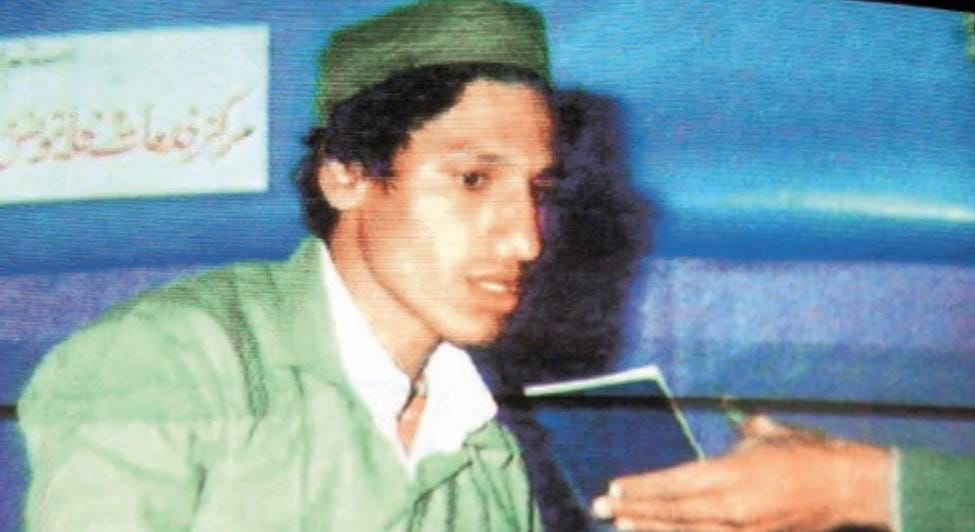

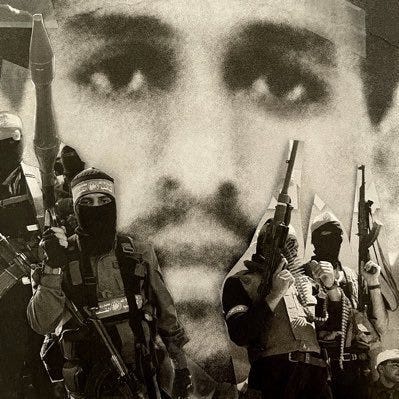
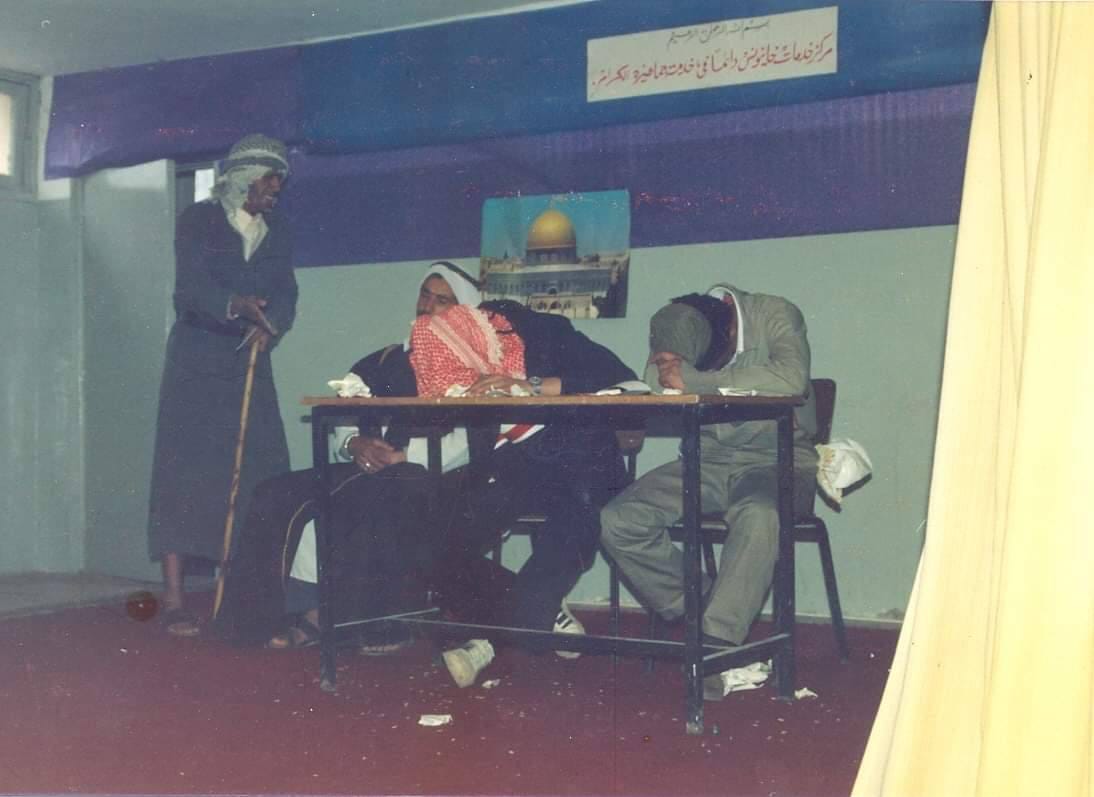

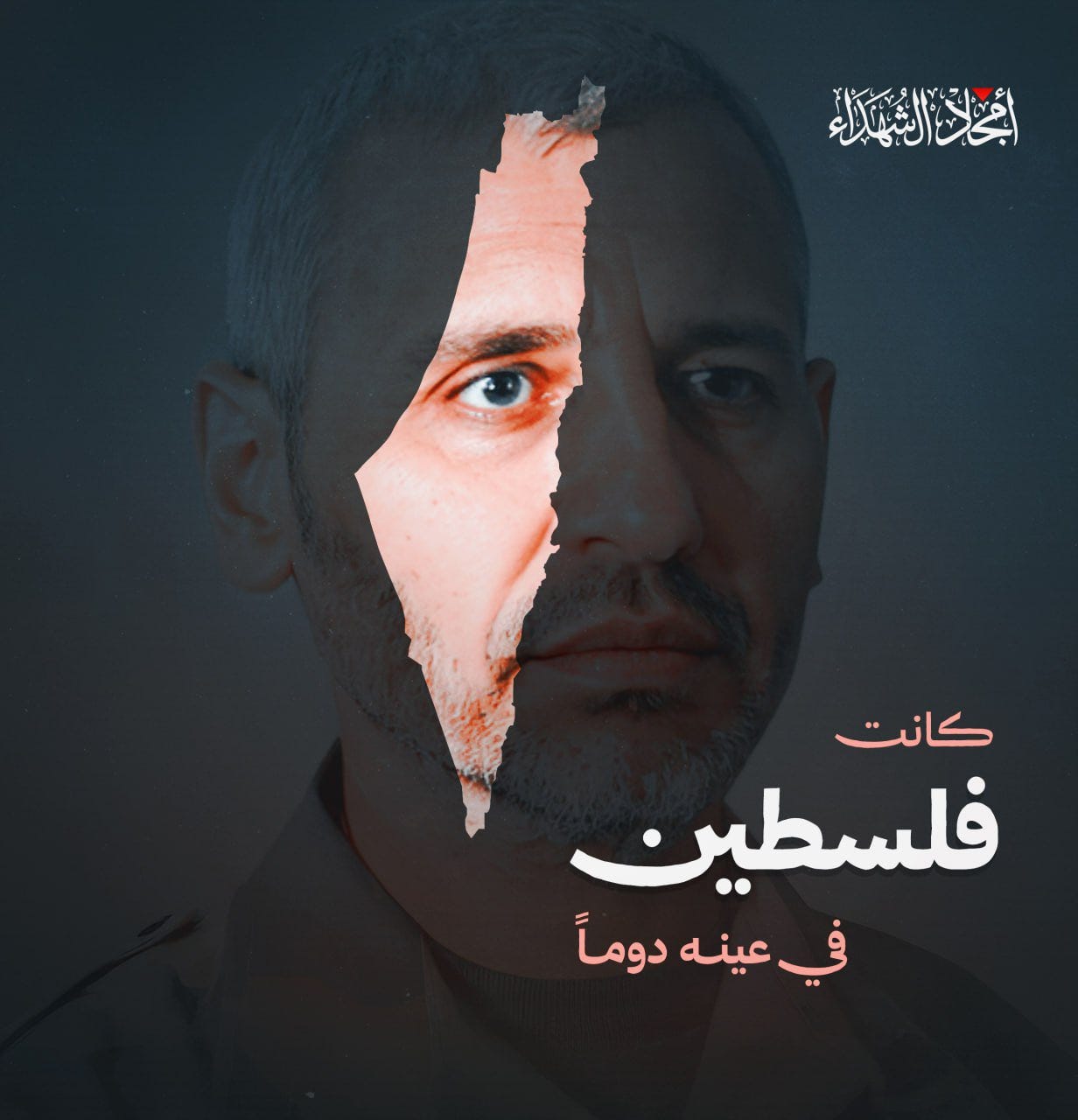

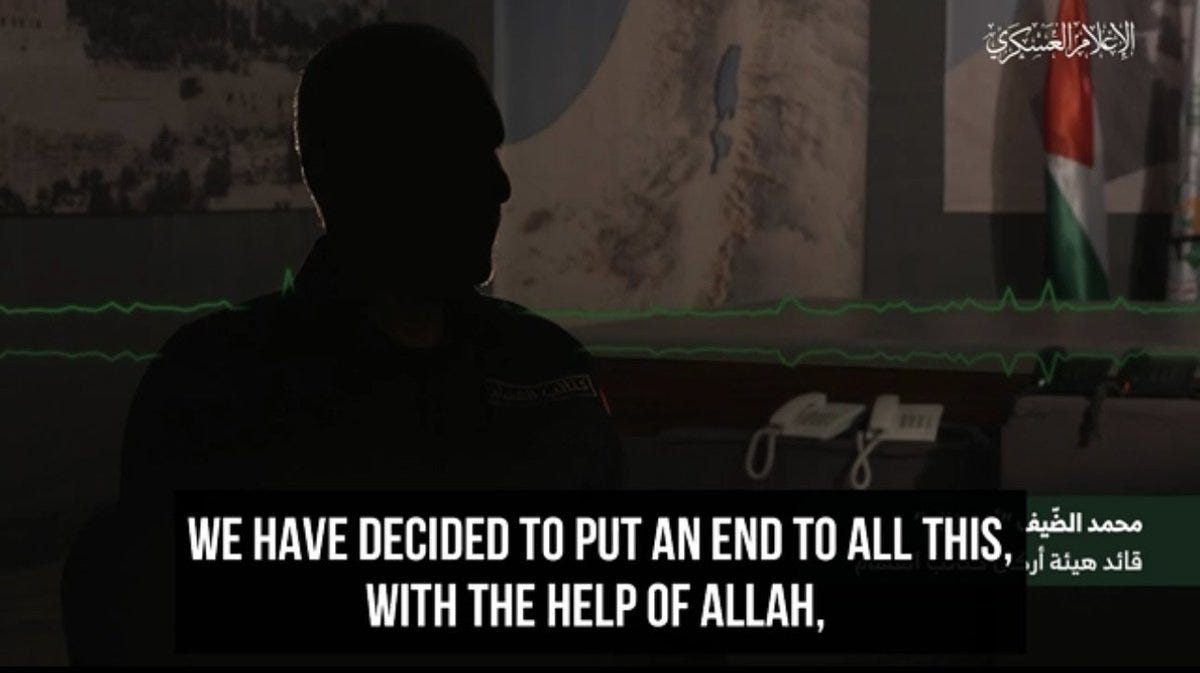
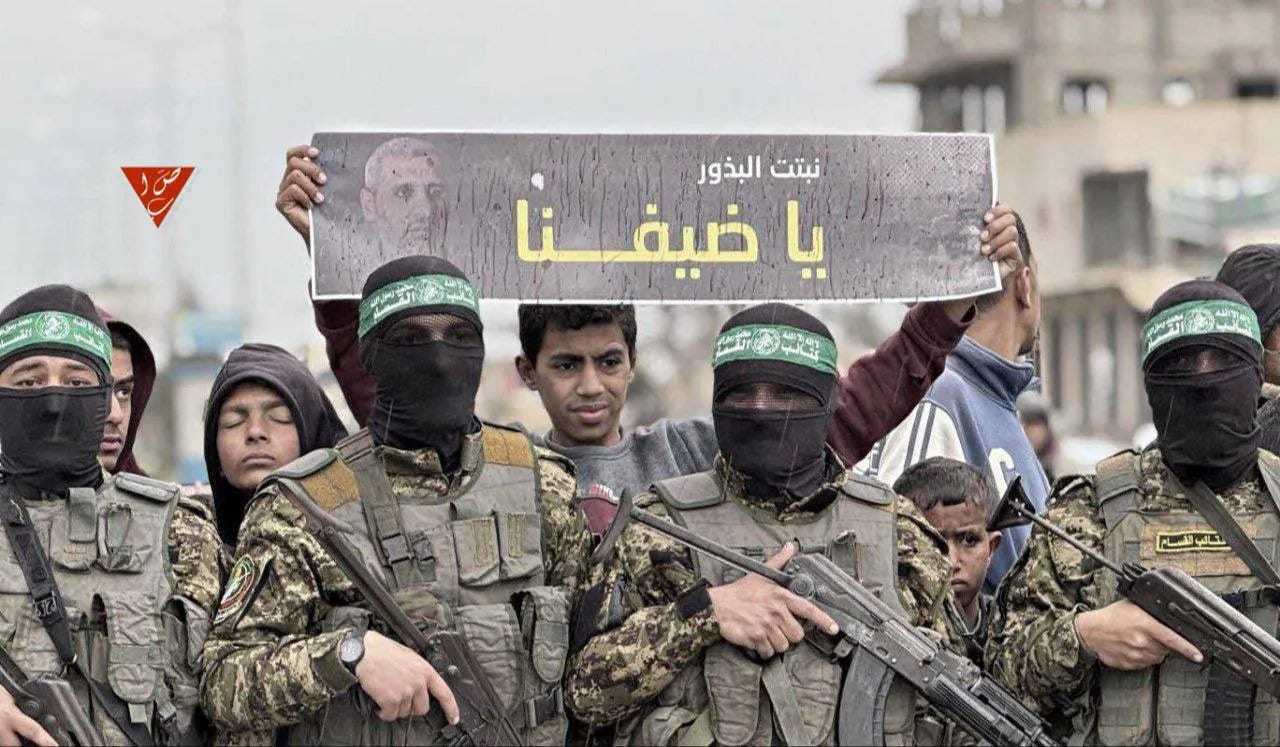

Sub7an Allah, I was thinking about your articles just a few moments before receiving a notification of this one. Thank you, as always, for your writing, which I cannot praise well enough with mere words. May Allah guide us all to the right path for we are indeed in end times.
This brought me so much strength. Thank you. Allahu Ackbar